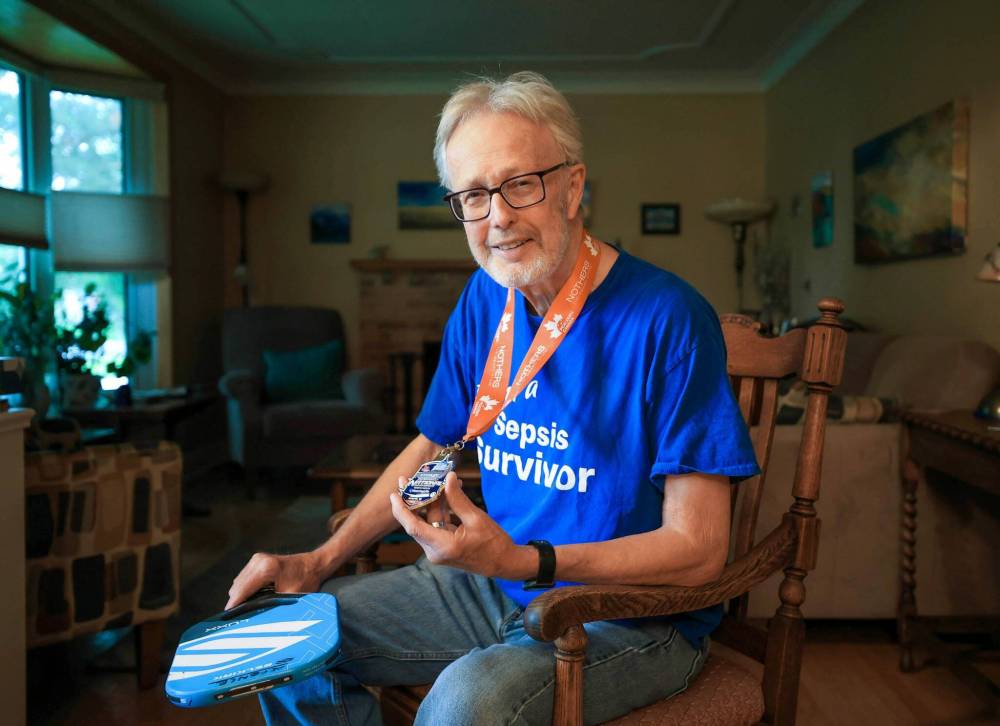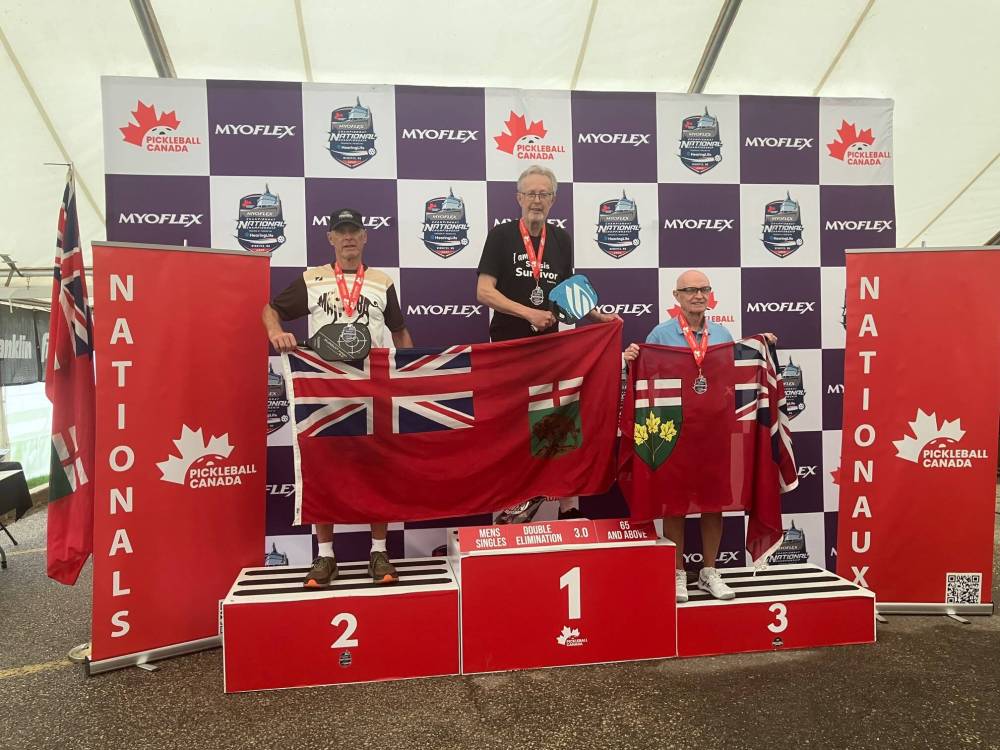‘I’m playing for sepsis survivors’
Horsburgh’s national pickleball win a step in his journey driving for change
Advertisement
Read this article for free:
or
Already have an account? Log in here »
To continue reading, please subscribe:
Monthly Digital Subscription
$0 for the first 4 weeks*
- Enjoy unlimited reading on winnipegfreepress.com
- Read the E-Edition, our digital replica newspaper
- Access News Break, our award-winning app
- Play interactive puzzles
*No charge for 4 weeks then price increases to the regular rate of $19.00 plus GST every four weeks. Offer available to new and qualified returning subscribers only. Cancel any time.
Monthly Digital Subscription
$4.75/week*
- Enjoy unlimited reading on winnipegfreepress.com
- Read the E-Edition, our digital replica newspaper
- Access News Break, our award-winning app
- Play interactive puzzles
*Billed as $19 plus GST every four weeks. Cancel any time.
To continue reading, please subscribe:
Add Free Press access to your Brandon Sun subscription for only an additional
$1 for the first 4 weeks*
*Your next subscription payment will increase by $1.00 and you will be charged $16.99 plus GST for four weeks. After four weeks, your payment will increase to $23.99 plus GST every four weeks.
Read unlimited articles for free today:
or
Already have an account? Log in here »
In a hospital bed nine years ago, Mac Horsburgh was given a 25 per cent chance to live. Today, he’s a national champion.
Last month, Horsburgh, 76, won gold at the 2025 national pickleball championships in Winnipeg. A sepsis survivor, Horsburgh’s first gold medal was a testament to his endurance.
“I was very elated to win that gold medal,” he said. “It was a confirmation of my athletic ability and my ability to overcome the adversity that went with sepsis survival.”
Ruth Bonneville / Free Press National pickleball champion Mac Horsburgh, a sepsis survivor, said the sport helped bring back his health after his traumatic encounter with the infection nine years ago.
Horsburgh’s battle with sepsis began in early April nine years ago when he developed a cyst on his finger, which opened and became infected.
After being misdiagnosed — and on his third visit to a physician over two weeks — Horsburgh was properly diagnosed with cellulitis, a bacterial infection of the skin and tissues beneath the skin. His antibiotics were swapped out, but it was too late.
The next week, after having dinner with his mother, Horsburgh collapsed at home. The infection had spread to his stomach, causing a ruptured aneurysm.
He was rushed to the intensive care unit at St. Boniface Hospital, where Horsburgh stayed for the next three weeks. He was eventually put into an induced coma for 10 days.
During that time, his wife Laura Roberts, 63, was told Horsburgh had a 25 per cent chance of surviving. She was asked to sign a do not resuscitate form.
“I broke down,” she said. “I started crying… that was really when it obviously hit me.”
But Roberts, knowing her husband was in good health, was not ready to give up.
Two years prior, Roberts had been treated for breast cancer — something she believes helped her when advocating for her husband’s life.
Roberts had found a lump in her breast. After two mammograms came back negative, she insisted on a third, which returned positive with two small tumours.
“If I hadn’t advocated for myself at that point, it would’ve gone on,” she said. “I think that kind of helped (with Horsburgh).”
Roberts arrived early every morning to visit her husband and make her rounds with the medical staff.
“I need to stay positive, because I need this team to stay positive,” she said was her mantra at the time.
SUPPLIED Mac Horsburgh won gold in men’s singles 3.0 (65-plus) division at last month’s nationals. From left: silver medallist David Adamson, gold medallist Horsburgh, bronze medallist Lorne Keon.
On the tenth day, Horsburgh woke up and slowly began the recovery process. His muscles were atrophied, and he couldn’t comfortably sit or stand.
It wasn’t until months later when Horsburgh first heard the term ‘septic shock.’
“The word sepsis was never used when I was in the hospital,” said Horsburgh.
He added that: “One of the struggles when you recover from sepsis is trying to make sense of what happened to you.”
After being discharged, Horsburgh developed Post-Traumatic Stress Disorder (PTSD), common among sepsis survivors.
“I was dealing with a lot of emotions that I’d never encountered before,” said Horsburgh. “One being rage about what happened to me and the other one being ecstatic to be alive.
“It was difficult for my wife and my family to see me like that.”
The trauma, lack of information, and delirious episodes from his hospital visit were all factors in Horsburgh’s PTSD, which trickled down to his wife and children.
“Our whole family had PTSD to be perfectly honest,” said Roberts. “It definitely was very traumatic.
“Once you’re discharged, you’re kind of on your own,” she continued. “We weren’t really kind of told that this is going to happen, so that was hard for him.”
The day Horsburgh was induced into a coma, his youngest son Carson, then 19, had to write a university exam. He and his mother both sought out counselling afterward.
“It had a huge impact on both of them,” said Horsburgh.
Eventually, Horsburgh began walking. At first, he’d walk from one tree to another on his boulevard. Eventually, he began walking multiple blocks.
“It’s persistence in the face of adversity,” said Horsburgh, “you’ve got to keep going.”
“It’s persistence in the face of adversity, you’ve got to keep going.”
Five years ago, Horsburgh was walking around the Reh-Fit centre with his son Carson when they saw pickleball being played. They asked to join, and Horsburgh immediately fell in love.
“I essentially got hooked,” Horsburgh said. “It was just a perfect fit for me in terms of my previous sports background.”
Horsburgh had a history as a competitive tennis and handball player. He played tennis at the University of Dalhousie, winning the Atlantic University Sport championship in 1973.
Horsburgh played competitive handball into his early forties, before marrying Roberts and having two sons, Carson and Graham.
Horsburgh began competing in pickleball tournaments three years ago. He’s medalled in several events since, but had yet to win gold.
Earlier this year, Horsburgh won silver at a provincially sanctioned tournament. To win gold at nationals, he would face the same opponent who beat him in provincials, David Adamson.
Stepping onto the podium after his victory, it began to sink in.
“For me, it was a new experience to get up on that podium,” he said. “I feel very fortunate and gratified to have won that medal.”
Spreading awareness
Since his encounter with sepsis, Horsburgh advocates to spread awareness. When it comes to sepsis, he said acting fast is one’s best chance of survival.
The Canadian Sepsis Foundation defines sepsis as a “life-threatening condition that occurs when the body’s response to an infection injures its own tissues and organs.”
Considered the most preventable cause of death in Canada, one in 18 Canadian deaths are related to sepsis. The condition’s mortality rate is between 30 to 50 per cent.
Sepsis affects roughly 18-million people globally each year.
For Horsburgh, a gold medal is but a stop on his journey as he continues to champion new research for sepsis as a patient partner and advocate. He’s published works with the University of British Columbia, The Globe and Mail and the Free Press, spreading awareness on this unique condition.
“One of the biggest issues for a sepsis survivor is trying to get resources and information,” Horsburgh said. “There was absolutely nothing for me when I got out of the hospital.”
Ryan Zarychanski, professor of medicine in hematology and critical care at the University of Manitoba’s Max Rady College of Medicine, said Horsburgh’s devotion has been a driving force for sepsis research in Canada.
“Mac is definitely a very special individual,” Zarychanski said.
“He suffered greatly with a severe infection that almost cost him his life, and he turned that really serious and life-changing event into one that has brought much spotlight into the importance of recognizing infection early in individuals and providing prompt diagnosis and treatment.”
Zarychanski leads a large research team that study sepsis in critically ill patients, and he said Mac’s influence helps drive the agenda for what to do next.
“It’s been a tremendous experience to work with Mac,” said Zarychanski. “Truthfully I’ve learned as much from Mac as I hope we’ve been able to contribute back to the field of medicine.”
Moreover, Roberts believes Horsburgh’s advocacy has helped him find healing.
“All the advocacy work that he’s done I think really helped him deal with everything that happened with him,” she said.
Horsburgh feels giving back to the community is a responsibility.
“I began to think, ‘I want to give something back here,’ because I met some fantastic medical people who saved my life,” he said.
Horsburgh continues to play pickleball, with tournaments coming up in Gimli this month, and Arborg in October. He feels he is only getting better and hopes to play pickleball as long as he can.
“Pickleball was really a bit of a lifesaver for me, too,” he said. “It gave me an opportunity to be active again.
“I feel like I’m not playing singles pickleball for myself, I’m playing for sepsis survivors.”
sports@freepress.mb.ca
Our newsroom depends on a growing audience of readers to power our journalism. If you are not a paid reader, please consider becoming a subscriber.
Our newsroom depends on its audience of readers to power our journalism. Thank you for your support.

